- Home
- David Pilling
Caesar's Sword (I): The Red Death Page 5
Caesar's Sword (I): The Red Death Read online
Page 5
The youth beckoned at us. “My name is Leo,” he said, “I am one of the principal trainers here. Let me have a closer look at you.”
We obediently trotted up the steps. I noted that Leo was muscled like an acrobat, and had something of the caged animal about him, an unpredictable loose-limbed vitality. He had difficulty standing still, and shifted from one sandaled foot to the other as he spoke to us.
He snapped his fingers to dismiss the guard, who wandered away with a thunderous expression on his face. “So, boys,” he said, “I understand you wish to join the circus. Better to earn a living wage and sleep with a roof over your heads than starve in the gutter, eh?”
“Yes, sir,” we chorused.
Leo smiled crookedly and folded his muscular brown arms. “We get hundreds of little street-rats like you two,” he said, “and turn away most of them. We’re a working circus, not a bloody orphanage. Impress me.”
His voice, which always possessed a soft and musical quality, had taken on an aggressive tone that made me bristle. “I can box,” I said, taking up what I imagined to be a fighter’s stance and balling my little fists, “and ride a horse.”
This was an exaggeration. I had not backed a horse for years, ever since Clothaire’s Sarmatians let me ride one of their beasts during the journey from Paris. I didn’t care. Something about Leo’s manner irked me, and I was determined that he would not turn us away.
“You have a strange accent,” he said, cocking his head and looking me up and down, “where are you from?”
Britannia, I told him.
“Interesting. We don’t get many of your people. What about you?”
He spoke to Felix, who copied me and adopted a fighting stance. “I can also box,” he said stoutly, “and anything else I turn my mind to.”
Leo’s smile widened into a toothy grin. “We shall see,” he said, “come. You have persuaded me into giving you a trial.”
We should have turned and ran away then, and saved ourselves a world of pain and grief. But we were not to know the future, or that Felix’s fate-stones had lied to him.
Leo took us through the passage beyond the Black Gate onto the race-track. I had occasionally wormed my way into the arena and watched the races from the standing area above the cheap stalls, but never stood on the track itself. That privilege was reserved for the athletes and performers, a few scattered groups of whom were in training as Leo led us out.
Seen from the track, the vast scale of the Hippodrome stole my breath away. It was based on the old Circus Maximus in Rome, but surpassed that in size and magnificence. The southern end was formed into a curved tribune or U-shaped structure, while the northern end was occupied by the Starting Boxes, from which the chariot teams would emerge at the beginning of a race. There were twelve boxes, one for each chariot, and the roof was crowned by a statue of four gilded horses cast in bronze.
Marble seats for senators and other wealthy dignitaries were located nearest the track, with wooden benches for the poorer citizens above. Above those were the standing-room only areas that I used to squeeze into. At the eastern end of the Hippodrome was the Kathisma or imperial lodge, which the Emperor and his family accessed via a passage connecting the lodge to the Great Palace. Here the Emperor had his own private box to watch the entertainment in the arena below. It was decorated with silken hangings and tapestries worked in gold and imperial purple.
During previous visits to the Hippodrome I had beheld the Emperor Anastasius in the imperial box, and was surprised and disappointed to find that the most powerful man in the Empire was aged and ugly, bent under the weight of years and perpetual duty.
All this my eyes took in as I stood and looked around at that huge enclosed space. Leo allowed me and Felix to stare awhile, grinning at our awestruck expressions.
The spine of the track itself was lined with bronze statues of horses and chariot drivers, as well as extraordinary monuments to imperial glory and excess. One was the Tripod of Platea, a massive stone tripod cast centuries before to celebrate an age-old victory of the Greeks over the Persians. The peak of the tripod was adorned by a golden bowl supported by a trio of serpent heads. The spine and edges of the track were also decorated with statues of the various gods, emperors and heroes of Greek and Roman legend.
“They put me in mind of you two,” remarked Leo, jerking his thumb at a statue of Romulus and Remus, the infant founders of Rome, suckling from the wolf that nurtured them in the wild, “just beware of the wolf’s jaws, eh?”
Chapter 7
Leo wasted no time in putting us on trial. Since we were young, the trials were more of courage and patience than ability. My claim to be able to ride was tested when he swung me onto the back of a lively Arab mare, and made her trot in a circle while I clung on. I was allowed no saddle or harness, and had to dig my fingers into the Arab’s mane to save myself from falling.
“Keep your back straight,” Leo called out. I did my best. If I had showed any fear, or laid flat across the horse’s back, I would have failed the trial.
Fortunately, I turned out to possess a natural affinity for horses and riding: after all, my ancestors were horse-soldiers. After I had successfully bounced up and down on the Arab for a few turns, Leo declared he would try me on a larger and more intimidating beast, a glossy black mare that was still being broken.
It was impossible to conceal my terror of the mare. A team of sweating grooms dragged her onto the track via ropes secured about her neck. They were careful to keep clear of her flailing hoofs as she reared and snorted, her mad eyes rolling in anger.
“Let’s see you stay aboard her, boy,” Leo said cheerfully, “her name is Tisiphone, after one of the Furies. The avenger of blood, I believe.”
He laughed, for I was trembling visibly. Felix, whose own trial was scheduled after mine, caught my eye and shook his head.
“I have to,” I whispered, and took a reluctant step towards the terrible horse. Her forelegs were skidding across the track as she plunged and fought her handlers. One of her plate-sized hoofs kicked up a cloud of dust that hit me in the face, blinding me.
Leo roared with laughter as I fell onto my backside and rubbed my eyes. He was so engrossed he didn’t notice as another man approached us.
“What in hell is going on?” demanded the newcomer in a harsh, gravelly voice that was used to being obeyed.
I wiped the last of the dust from my eyes and stared up at him. He was an ageing bull of a man, twice the size of Leo, and everything about him radiated crude strength and authority. I recall a large round head with hardly any neck to speak of, massive shoulders corded with thick slabs of muscle, and long arms, somewhat like an ape’s, ending in big, powerful fists.
The man’s voice was cracked and wheezing. He breathed heavily even when not speaking, as though something ailed his lungs. I judged him to be in his fifties. His hair was nothing more than a thin smear of grey on his scalp, his nose a squashed and much-broken horror, and his teeth reminded me of a broken fence. For all that, there was no malice in his expression, and he looked at me and Felix with genuine concern.
Leo started when he noticed the giant at his elbow. “Just putting two new volunteers through their paces, Aquila,” he said with bad grace, “they came to the gate this morning.”
Aquila rubbed his unshaven jaw and cast a sceptical eye at Tisiphone. “That monster will kill them,” he rumbled. “She broke Gallus’s leg a couple of days ago. Don’t be so bloody stupid, Leo. We are not in the business of crippling children. Have them trained on milder beasts.”
Leo’s face darkened with anger, but he submitted and ordered Tisiphone to be returned to her stable. Aquila gestured at us boys to stand in front of him.
“I am Aquila, chief overseer of the Blues,” he said, “it is my job to watch over our people and make sure they are being trained and looked after properly. Leo works for me. So will you, if you pass muster. Unless you would prefer to join our rivals?”
He referred to the Gre
ens. Neither I nor Felix held any preference. We had always looked to ourselves rather than supported either of the factions.
“We are happy to join the Blues, Kurios,” I replied. He studied us gravely for a moment, and then gave a little nod.
“Be wary of Leo,” he said as he turned away, “he’s a good trainer, and you can learn a lot from him, but inclined to be over-zealous. If he gives you any trouble, come to me.”
We learned a great deal in the following days, not just about Leo, but the Hippodrome and the people who lived and worked in it. Below the arena was a large subterranean warren of storehouses and chambers. Here the Greens and the Blues stored costumes, props and equipment. We were surprised to learn that several branches of imperial government also had their departments here. Sombre clerks and officials in plain robes cheerfully rubbed shoulders with athletes, charioteers and the more flamboyant members of the circus, actors and dancers and gymnasts and the like.
Leo delegated one of the latter to show us around the Hippodrome, saying he had no time or patience for the task. I think we had angered him by passing our trials with ease – Felix gave each of the older boys he was placed in the boxing-square with a bloody nose – and his delicate pride was stung by Aquila’s reprimand. He gave the task to one of the actresses, a young girl no more than thirteen or fourteen named Theodora.
Placing Theodora in charge of a couple of innocents was, I think, Leo’s notion of a joke. I knew nothing of her, but was soon to learn of her reputation. Even then, it was a foul one.
It is only with difficulty that I set aside my hateful memories of Theodora. To glimpse her again as I first saw her, a slender, fresh-faced girl with ivory skin and a delightfully winning manner, is a severe effort of will and memory.
Theodora’s manner, which as a child I took to be natural and unforced, was mere artfulness, concealing the depths of a personality forged in Hell. Her waifish beauty and creamy skin were genuine enough back then, though in later years she fought a losing battle to preserve them with cosmetics.
Such was the true nature of the lovely young girl who escorted us, laughing and chattering, through the labyrinth beneath the Hippodrome. She confessed to adore children, and was especially amused by me.
“I have met few of your people before,” she said, gently caressing my hair in a way that reminded me, with a stab of pain, of my mother. “Though I have heard stories about Albion, that cold northern isle, and the courage of its inhabitants.”
Her voice was soft and teasing, and had a practised sensual quality that made me redden, even though I was still at the age where females were little more than a nuisance.
“Child of Albion,” she said with the gentle smile that drove legions of young men mad with desire, “we must give you another name. A proper, civilised name. Coel is nothing but a barbarous noise.”
I bridled at this, and for the first time in years was reminded of the pride of my ancestry. “I am named after my forefather, Coel Hen,” I replied. “He was a great warrior, and a great king.”
Her smile didn’t waver. “A king of mud huts and wet hillsides, no doubt, who hopped about in a suit of woad. However, I see you take some pride in your family. That is to be applauded.”
She paused to let a scribe with ink spots on his face shuffle past, almost bent double under a great heap of papyri.
“The Emperor Claudius named his son Britannicus, in memory of the Roman conquest of your country,” she said thoughtfully, tapping her delicate cheek, “it would not to do name you after an Emperor’s son, unless the inferiority is acknowledged. Let us call you, then, Britannicus Minor.”
I didn’t care for that, but it made Felix smile, and Theodora was amused enough by her own witticism to re-tell it until the name stuck. For the rest of my time at the Hippodrome I was known as Britannicus Minor, which served as a constant irritation and a reminder of Theodora’s persuasive arts. Further evidence of her unusual talents was not long in coming.
After Felix and I were formally bestowed with the blue garlands that marked us out as members of the Blues, we were considered proper members of the company and permitted to reside in the athlete’s quarters at the Hippodrome. This achieved our main object, of gaining food and shelter and employment. We had to work hard for the privilege of membership, and Leo and his fellow trainers wasted little kindness on their younger charges.
Having noticed my affinity with horses, Aquila instructed Leo to train me as a charioteer, which meant I would eventually participate in the races that were the main spectacle at the arena. The other traditional Roman games, such as the blood-stained gladiatorial combats, had long since been abolished. Felix, who was frightened of horses and preferred not to go near them, was marked for the lesser honour of being trained as a boxer and wrestler. Such contests took place during the intervals between races, along with the acting and gymnastic displays.
I was concerned that Felix would resent me for this, but he was too noble a spirit to harbour such petty jealousies. “God gave you a talent, syntrophos,” he said to me with a rueful smile, one eye closed and swelling from a brutal practice session, “you must take full advantage of it.”
To be indentured as a charioteer at the Hippodrome was just another form of slavery, and for most there were only two ways out: death or purchase. The most famous and successful charioteers, such as the famous Diocles, won enough money to retire from what was invariably a lethal and short-lived career.
From the beginning we junior charioteers were encouraged to think of our rivals in the Greens as mortal enemies. Injuries and even deaths were common in the races, which were fiercely contested and always featured a large degree of violence and foul play - unsurprisingly, since huge amounts of money were wagered on the outcome.
No-one in the city, even high-ranking senators and members of the imperial family, was above betting on the races. The high stakes involved led to bitter feuds and clashes in the streets between supporters of the rival factions. Constantinople was racing-mad, and what had started as a mere sporting contest was becoming a threat to the stability of the Roman state.
My training began with smaller versions of the full-size chariots, which were essentially wooden carts with two wheels and open backs. The smaller chariots were pulled by teams of four ponies each, in imitation of the standard four-horse teams. Leo trained us to drive in circles around the track, and how to guide the ponies with whips and shouted instructions. He also gave us instruction in the darker arts of competitive racing.
“The aim of a race,” he would say, having ordered his apprentices to sit cross-legged in a circle around him, “is not only to beat your rivals, but to humiliate them in front of the crowd. It is not enough to simply drive faster. You must strive to get in front of the opposing chariot and make it crash into the spine.”
The spine of the track was where the towering obelisks and many of the statues of gods and heroes were located. It was now that we learned their practical purpose. Any fragile chariot that careered into one of these mighty sculptures would be smashed to pieces. The drivers and horses would be lucky to get away with minor injuries.
“This,” he added, holding up the flail-like whip, “is both a tool and a weapon. You can use it to attack opposing drivers, and flick it at the eyes of his horses. There are very few rules, out on the track. All that matters is victory.”
He gave us his crooked grin. “The Greens, of course, will be trying to serve you the same way. It is my job to teach you to be faster and better than them. More ruthless. I am extremely good at my job, so those of you who want to reach old age will harken to me.”
Leo was a vicious character, and delighted in the bloody and underhand aspects of racing. From discreet enquiry with Theodora I learned that he was from the mountains of Isauria, the son of a peasant, and like me had come to the Hippodrome as a child.
“He was a skilled charioteer,” she told me, “but not quite good enough to be ranked among the best, and clever enough to quit before he ca
me to harm. The life expectancy of a charioteer is not very high.”
“I wonder how long you will last, my dear little Briton?” she added, fondly stroking my cheek, “a glorious life, but a short one.”
I brushed her fingers away. “I am the child of kings, and not destined to die in the arena,” I replied stoutly.
My reply interested her, and some of her usual careless insouciance dropped away. “So you have a sense of destiny, and of a life beyond the Hippodrome. Clever boy. This place is a means to an end, nothing more. Do you dream, then, of returning to Albion and reclaiming your ancestral kingdom?”
I still trusted Theodora at this stage, and was fool enough to confide in her. “No,” I replied awkwardly, “my dreams are ruled by the shadows of my forebears, and the sword they wielded. The sword was mine, but I lost it.”
She frowned, and the mild interest in her large, expressive eyes faded. “You dream of regaining a sword. How dull. A sword is just a thing of wood and metal. What good can it do you? My dreams are rather grander than that. Unlike you, I have the means to achieve them.”
Chapter 8
Years passed, and I grew from a scrawny, underfed little boy into a wiry, leggy youth, strong and athletic thanks to the brutally disciplined regime I lived under. I gave my masters little cause for complaint, for one who has been a slave knows how to maintain a façade of obedience and humility. I was careful to keep quiet, make few friends save those whom I could absolutely trust, and train with all the diligence and commitment required of me.
I grew into a competent charioteer, and a good enough actor to feign hatred for the Greens. In truth I felt no real dislike for the opposing faction, though Leo and his colleagues did their best to drum it into me. Perhaps I was more independently-minded than the other boys, or the knowledge of my father’s susceptibility made me more wary of being told what to think.

 The Growth Delusion
The Growth Delusion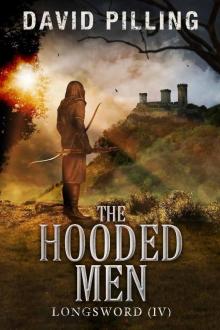 The Hooded Men
The Hooded Men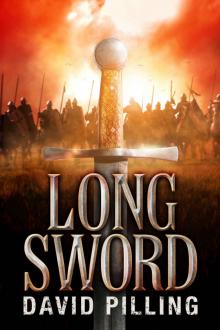 Longsword
Longsword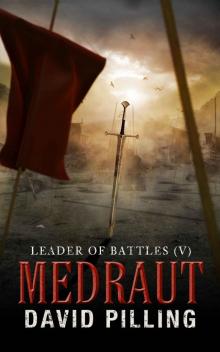 Medraut
Medraut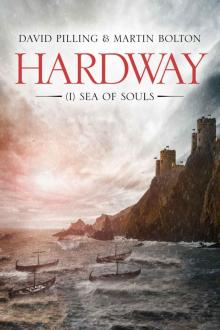 Hardway
Hardway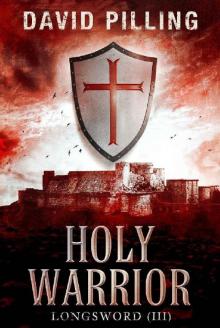 Holy Warrior
Holy Warrior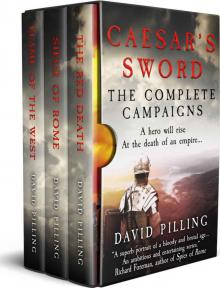 Caesar's Sword: The Complete Campaigns
Caesar's Sword: The Complete Campaigns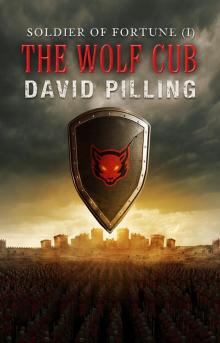 The Wolf Cub
The Wolf Cub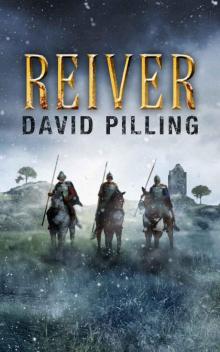 Reiver
Reiver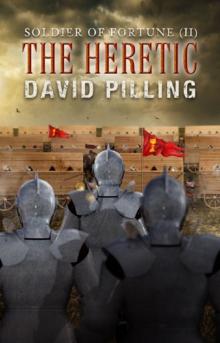 The Heretic
The Heretic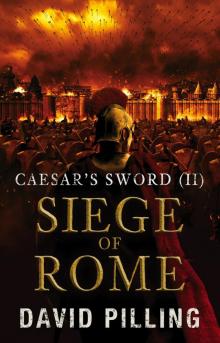 Siege of Rome
Siege of Rome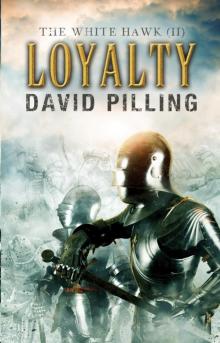 Loyalty
Loyalty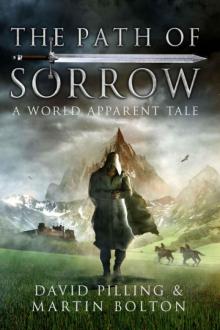 The Path of Sorrow
The Path of Sorrow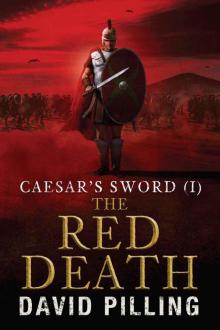 Caesar's Sword (I): The Red Death
Caesar's Sword (I): The Red Death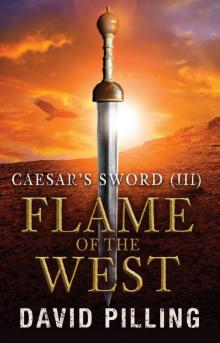 Flame of the West
Flame of the West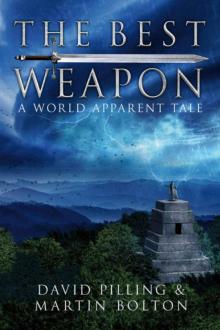 The Best Weapon
The Best Weapon Sacrifice
Sacrifice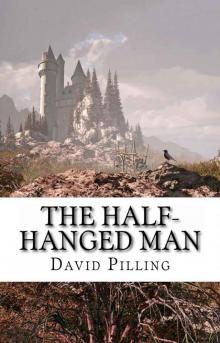 The Half-Hanged Man
The Half-Hanged Man